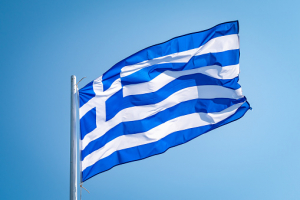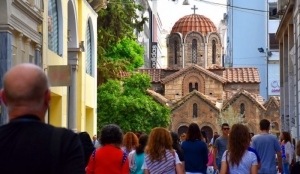WELLNESS HUB
XpatAthens
Martis: The Greek Tradition Of Welcoming Spring
The ancient tradition of Martis, from which the month of March gets its name, dates back to the cults of Demeter and Persephone, thousands of years ago, when the faithful used to wear a bracelet called a “kroki” around both their right hand and left ankle, as a form of initiation into the cult.
Surprisingly, this tradition still lives on today and it is a way to usher from winter to spring. According to this tradition, if you tie a red and white string around your wrist on March 1, it will protect your cheeks from burning in the sun. The bracelet must be woven on the last day of February, with the white thread representing purity and the red thread the color of sun-kissed cheeks. In ancient times, people thought that the bracelet protected the person wearing it from sickness.
In some parts of Greece, the bracelets are taken off on the first sign of spring, when the first flowers begin to bloom or when the birds start returning from their winter migration. Then they are tied around a branch of a tree to keep it healthy and help birds make their nests.
In other regions of Greece, they're thrown into the fire that is used to burn the floral first of May wreaths!
The Tradition Of Tsiknopempti
Tsiknopempti is the Thursday during carnival that marks the coming of lent, and the last day that observant Greek Orthodox parishioners eat meat before they begin their 40-day fast.
Tradition has it that on this day everyone prepares and enjoys their favorite meat dishes and typically a cloud of smoke where it is being cooked or barbecued. This gives Tsiknopempti one of its other common names, "Smoke Thursday" or "Smoked Thursday". It is also called "Barbecue Thursday" or "Grilled Thursday" by some. Tsiknopempti is also a popular day for going out to eat and enjoying as many different meats as possible. Be sure to reserve a table ahead of time as restaurants and traditional taverns are typically fully booked!
Meaning of Tsiknopempti
In Greek, Thursday is Pempti (Πέμπτη), meaning the fifth day of the week as Greeks count Sunday as the first day. The word tsikna (Τσίκνα) refers to the smell of cooked meat - however, "Smelly Thursday" has not caught on as a translation.
In English, Mardi Gras means "Fat Tuesday" and so Tsiknopempti is sometimes also called "Fat Thursday" - which is logical as the cooking of all that meat results in vast quantities of fat dribbling down onto the coals.
Typical Tsiknopempti Menu
Meat is king, with the emphasis on grilled meats! Some restaurants and virtually every traditional taverna will put on special menus for Tsiknopempti. By far, the most common item will be some variation of souvlaki - the Greek version of meat on a stick. These are available almost everywhere - walk carefully to avoid banging into an unexpected grill mostly obscured by smoke, sharing the already narrow streets and walkways!
Tsiknopempti Outside Of Greece
An equivalent of Tsiknopempti is also celebrated in Germany and Poland, but there they are adhering to the Western calendar for Easter, so the date differs. Most Eastern Orthodox and Greek Orthodox church calendars will be in alignment for Tsiknopempti and the rest of the Carnival, Lent, and Easter seasons, but there are some exceptions for faith groups adhering to a different variant of the old calendar.
Greek Easter Eggs
Name Days & Name Day Customs In Greece
How Name Days Are Celebrated In Greece
Traditionally, name days are celebrated as an 'open house' where close friends and relatives drop by to give their wishes, offer a small gift, and receive the traditional 'kerasma' (food, sweets, coffee, and drinks). In recent years the 'open house' tradition has changed and name days are celebrated by invitation.
It is customary to call and offer wishes and congratulate someone on their name day – it's now also acceptable to send your wishes on social media too!! If a friend has a name day, then you wish them 'Chronia Polla' (Many Years) – a wish for good health and prosperity.
Naming conventions in Greece are still followed quite strictly, with the result that certain names are used for many individuals in a generation. In each generation, the eldest grandson in each family will be named after the grandfather, and the eldest granddaughter will be named after the grandmother. If someone had three children, and they all produce a male grandchild, all three of those cousins will have the same name. To top it all off, all those with the same first name will celebrate the same saint's Name Day.
XpatAthens has a name day widget at the bottom of our homepage. This widget is updated automatically with the names that are celebrated each day.
The Tradition Of Naming Your Child In Greece
Today, many young parents use the parent's names as the child's middle name, and some decide not to follow tradition at all.
It is very often that a baby's given name is typically Greek but is translated to something slightly different and a bit easier to pronounce. For example, Aspasia becomes Sia, Dimitris becomes Jim, Kostantina becomes Dina and so on.
Orthodox Tradition – Naming Your Child After A Saint
Each child, regardless of who they are named after, usually takes on the name of a Saint. In Greece, a name day is a very special day celebrated much like a birthday.
October 28 Holiday In Greece - Ohi Day
What Happened On This Day In History
It is said that at 3:00 am on October 28, 1940, an ultimatum was handed to Ioannis Metaxas at his home in Kifissia by the Italian Ambassador of Athens, Emanuele Grazzi. The ultimatum required the free passage of the Italian army through the Greek-Albanian border and thus began the occupation of some strategic areas of Greece.
After reading the letter, Metaxas turned to the Italian Ambassador and replied in French (which was the official diplomatic language at the time) with the historic phrase: 'Alors, c'est la guerre' (Well, this means war), thereby stating his negative position toward the Italian demands.
Grazzi in his memoirs, released in 1945, described the scene as, 'I have been ordered Mr. Prime Minister by you and I gave him the letter. I watched the emotion in his hands and in his eyes. With a firm voice and looking at me in the eyes, Metaxas told me, ‘This means war!’ I replied that this could be avoided. He replied NO. I added that if General Papagos... Metaxas interrupted me and said NO! I gave a deep bow, leaving with the deeper respect, this elder, who preferred to be sacrificed instead of enslaved.'
At the time, Metaxas expressed Greek popular sentiment, which was the denial of allegiance. This refusal was passed through to the Greek press with the word ‘Ohi’ (No). The word ‘Ohi’ was first presented as a title in the main article of the newspaper 'Greek Future' of N. P. Efstratios on October 30, 1940.
On this day in Greece, most public buildings and residences are decorated with Greek flags. You will see parades and other festivities throughout the country. It is a national holiday, which means that everything is closed, with the exception of cafes and food venues.
The October 28th holiday is also celebrated by many Greek communities around the world; parades and festivities are observed internationally including in major cities in the USA, Canada, and Australia.
Source: Newsbomb
Epiphany In Greece
This feast day in the Greek Orthodox Church is known as 'Theophania' which means 'a vision of God' or 'Christ shining through'. It is considered a very important day for the Greek Orthodox Church. In the Western Church, it is also known as "Three Kings Day", a celebration of the 3 magi visiting baby Jesus.
In the Greek Orthodox Church, Epiphany is celebrated as the revelation of Christ as the messiah and second person of the trinity, at his baptism, by John the Baptist, in the River Jordan. Another cause for celebration in the Greek Orthodox Church on this day is that Christ's baptism was only one of two occasions when all three persons of the trinity revealed themselves, at the same time, to humanity: God the Father, speaking from the clouds, God the Son, being baptized in the River Jordan, and God the Holy Spirit, revealed as a dove, descending from heaven.
The tradition is that a priest, surrounded by brave young men and boys, throws a cross into the sea, either from the harbour or from a boat at sea; the minute the cross leaves the priest’s hand, the divers jump into the freezing water to catch the cross. The lucky one who finds and returns the cross is blessed by the priest. As the cross is victoriously brought back, the priest releases a white dove, as a symbol of the holy spirit. This tradition is carried out to commemorate the baptism of Christ and to bless the waters.
To read this article in full, please visit: Greeker Than The Greeks
Greek Orthodox Easter In Athens
4 Steps To An Authentically Greek Christmas Dinner
Step 4. Festive Drinks
A Christmas dinner party isn’t complete without a drink or two! For a traditional Greek Christmas drink, try warm wine infused with orange and cinnamon or oinomelo, a Greek alternative to mulled wine which is simply warm wine with honey. These enticing festive drinks will definitely keep your guests warm and their spirits high!












